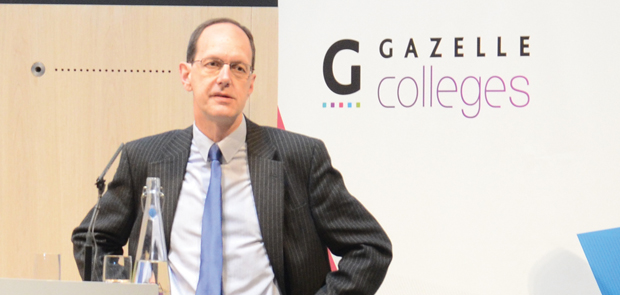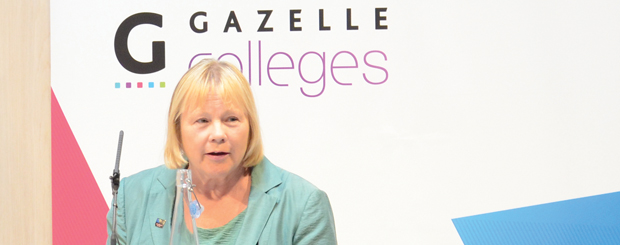It’s early days in the new relationship between FE and local enterprise partnerships, but how they will now work together was the centre of discussion at a London conference. Chris Henwood reports
Further education and its place at the centre of local “entrepreneurial ecosystems” was the theme of a conference organised by the Gazelle Colleges Group.
Skills Minister Matthew Hancock, Confederation of British Industry director general John Cridland and Pearson UK president Rod Bristow were among the speakers.
There was also representation from local enterprise partnerships (LEPs) with Dr Ann Limb, chair of the South East Midlands LEP (pictured below), addressing the conference, with David Frost, chair of the LEP Network.
More than 100 delegates, from colleges up and down the country, were at the event, held in the Royal Society for the encouragement of Arts, Manufactures and Commerce (RSA) base in central London on Tuesday, May 14.

CBI director general John Cridland
Mr Hancock said: “Enterprise needs to be embedded in the way a college operates. We have provided freedoms and flexibilities to give autonomy to leaders.
“I want to see strong leaders with strong governance and, of course, held to account firmly by Ofsted and the searchlight of accountability and data and publication of results.
“That enterprise will improve results on the ground rather than a system where the minister tries to dictate what happens.”
Dr Limb, a former principal and chief executive of Milton Keynes College and Cambridge Regional College, spoke on strengthening FE relationship with LEPs. “The big issue is how you work with employers to get them to demand training and skills that can be delivered for their benefit, for the benefit of the individual and for the benefit of the country as a whole,” she said.
Enterprise needs to be embedded in the way a college operates”
She added: “LEPs and FE have some real opportunities working together and yes, we’ve got to develop that relationship first. Obviously, LEPs are the body of the moment — only three years old, or thereabouts. They are responsible for setting strategies for driving economic growth.
“We will have the majority of EU structural funds starting next year allocated to us. Therefore it will give FE the opportunity to work with LEPs to dip into those funds.”
A summary paper from the UK Commission for Employment and Skills, with the 157 Group and Gazelle, was handed out for consultation.
It said that the three believed “that to create an environment where colleges and businesses truly engage requires a step change by both colleges and business”.
Among the questions the paper posed were ‘what are the big strategic changes required to enable colleges and businesses to build a long term and sustainable working relationship at a local, regional and national level?’
Visit www.ukces.org.uk/fe_business by June 30 to respond to the paper.
Featured image caption: Skills Minister Matthew Hancock
Q&A with Dr Ann Limb

Are LEPs ready for the responsibility for single funding pot?
Undoubtedly. What they would like to make sure is that government departments, including Business, Innovation and Skills particularly, are really lobbying to peel it away from central government control so that it can be properly bid and the local needs of the college and the employers can be met.
Does the adult skills budget need to be ring-fenced to protect it from spending on other LEP concerns?
Protection is perhaps not the verb I would use. Does the plan that the LEP produces — the strategic plan, the skills plan, the inward investment plan — ensure that adult skills training is at the heart of what it does, is the way I would phrase it.
If it does, then the money will flow to that need. So certainly adult skills training needs to be included and all LEPs would do that because the workforce that we have at the moment needs to have greater skills than it’s got and that’s what employers
tell us.
Should FE representation on LEP boards be mandatory?
If you start to mandate anything, you move away from the kind of entrepreneurial, innovative arrangements that should be in the DNA of the way we do things.
The education sector is a board member of my LEP and I certainly think you must have a local and national asset on the board. The way to do it is to regard the FE sector as a key public sector player and just have them there automatically, which is what we do.
Is there a danger that LEPs could see responsibility for skills as a hindrance?
Absolutely not. The skills issues are as critical as infrastructure issues to the success of UK plc. The LEPs are driven by the need to create jobs, to create new businesses, and to create homes for people to live in — just putting money into infrastructure will not deliver that. There is a separate governance arrangement now, a local transportation body, that oversees the infrastructure arrangements across a LEP.
That will have its money to deal with that. My LEP has a housing delivery fund and I would see us having a skills delivery fund — each fund earmarked for activities that are equally important.




